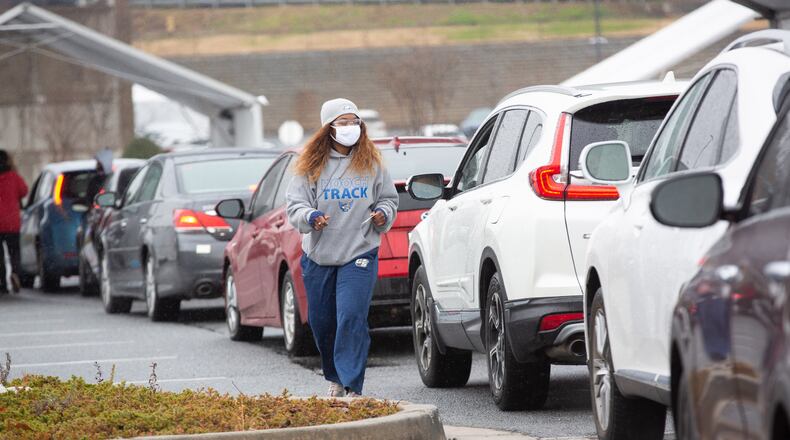The number of new coronavirus infections and hospitalizations is surging. The seven-day rolling average of confirmed cases and suspected ones is now close to 10,000 — more than triple what it was Dec. 1.
If that’s not bad enough, a far more contagious variant of the virus could become the predominant strain in March, the Centers for Disease Control and Prevention says.
Georgia reported the fourth-worst rate of new COVID-19 hospital admissions in the country.
Statewide, nine out of 10 ICU beds are full, and nearly half of those patients have COVID-19, according to state and federal hospital records.
Grady Memorial Hospital, the safety-net hospital, is full as it treats more coronavirus patients than ever before.
“If admissions continue to climb, I worry we will face what hospitals in other states grapple with — tough choices on providing care,” said John Haupert, the CEO of Grady Health System, which operates the hospital.
The White House task force is advising, as it has for months, that Georgia step up mitigation efforts, including masking, strict physical distancing and expansion of testing and vaccinations.
Here’s a look at other major developments related to COVID-19 over the past week.
Credit: Alyssa Pointer / Alyssa.Pointer@ajc.com
Credit: Alyssa Pointer / Alyssa.Pointer@ajc.com
Vaccinations remain priority
Georgia’s reported pace of administering the COVID-19 vaccine is in the bottom half of the country. But state officials have said that’s partly because data issues resulted in a significant underreporting of doses already administered. Officials said they’re working to fix those.
Initially, Georgia prioritized health care workers and those who work or live in long-term care facilities. Then, Georgia opened up eligibility to those 65 and older, adding about 1.5 million residents to the list of those who can get shots.
However, the state receives only about 80,000 doses per week to administer across 159 counties, not including what’s provided to CVS Health and Walgreen to run vaccination clinics at long-term care homes.
“There are simply vastly more Georgians that want the vaccine than can get it today,” Gov. Brian Kemp said.
Vaccine supplies have been allocated on a per capita basis. But, under a new allocation plan announced by Health and Human Services Secretary Alex Azar, the federal government will start rewarding states that have the best rates of vaccination by giving them more vaccines.
Credit: Curtis Compton / Curtis.Compton@
Credit: Curtis Compton / Curtis.Compton@
Georgia under pressure to vaccinate faster
States have two weeks to improve their performance and their reporting before the allocation criteria changes, according to Azar.
“Use every channel, get the vaccine out there,” he said. “I would rather have people working to get appointments to get vaccinated rather than having vaccines wasted in freezers.”
Beyond more doses, state officials acknowledge that it’ll take more staff — from the private sector, government, contractors and volunteers — to boost immunization numbers to where they need to be.
Understaffed local health districts have not been able to keep up with phone calls, and some have had to curtail COVID-19 testing in order to administer vaccines.
To date, said public health Commissioner Dr. Kathleen Toomey, providers have reportedly administered about 227,000 doses, nearly double the figure reported last week when there was a data backlog.
The federal government had shipped about 700,000 doses of the Pfizer and Moderna vaccines to Georgia as of Monday.
The number of Georgians eligible for vaccination is far higher. About 2 million fall into the categories of health workers, long-term care residents and staff, first responders and residents over 65.
Perhaps a million more in Georgia would qualify if the state makes eligible adults with serious underlying conditions, such as cancer, pulmonary disease, heart conditions, kidney disease, obesity, diabetes and Down Syndrome. Such conditions can make COVID-19 more severe. It’s up to governors to decide which people would be eligible and what documentation would be needed, Azar said.
State officials are considering creating mass vaccination centers.
Kemp also said the state would crack down on large providers that may be holding onto doses rather than administering them. He appeared frustrated that some — specifically hospitals — are holding doses in reserve to make sure that all the people who received their first dose can receive their second dose. The facilities signed contracts to administer vaccines as quickly and safely as possible.
“If this issue continues, the state will take possession of those doses and ensure vaccinations will continue,” Kemp said. “If it takes me firing up my pickup truck and doing it myself, so be it.”
State officials also said that CVS and Walgreens should be on schedule to complete the first round of vaccination clinics in all Georgia nursing homes by the end of the month. If not, Kemp said, the state will step in to assist.
Kemp is urging Georgians to be patient as the state focuses on reaching the most vulnerable.
New strain of virus detected in Georgia
The Department of Public Health has reported the state’s first confirmed case of the U.K. strain of the virus. The U.K. strain is believed to be about 50% more infectious than other common strains. It is not believed to cause more severe disease or be deadlier.
It’s unclear how widespread the U.K. strain currently is in the United States, but it’s believed to be less than 0.5% of cases, the CDC report said. However, the agency projects that, in March, the variant could become the predominant strain in the U.S.
And, while experts say people don’t necessarily need to take additional precautions, they do need to remain diligent. The public should do its part to prevent the spread of the disease by wearing masks, social distancing and frequently washing hands.
Staff writer Carrie Teegardin contributed to this report.
The Latest
Featured




